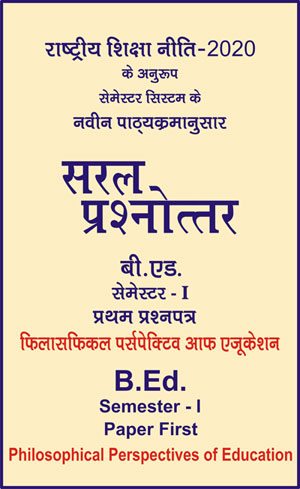|
बी एड - एम एड >> बी.एड. सेमेस्टर-1 प्रश्नपत्र-I - फिलासफिकल पर्सपेक्टिव आफ एजुकेशन बी.एड. सेमेस्टर-1 प्रश्नपत्र-I - फिलासफिकल पर्सपेक्टिव आफ एजुकेशनसरल प्रश्नोत्तर समूह
|
|
|||||||
बी.एड. सेमेस्टर-1 प्रश्नपत्र-I - फिलासफिकल पर्सपेक्टिव आफ एजुकेशन (अंग्रेजी भाषा में)
Question- Explain the salient features.
Or
Enumerate main principles of Idealism.
Answer -
Salient Features
- The Universe exists in Spirit: According to idealism, the spirit is the fundamental constituent of the universe. It points out that only mental life can be known because the mind is capable of knowing only its own states and its adjuncts. Every individual human mind is a part of the universal mind, outside which nothing exists.
-
Mechanical Explanation of the universe is inadequate: Idealists believe that the mechanical explanation of the universe is inadequate because it does not succeed in explaining human values. Idealists also refute the concept of mechanical determinism.
-
Teleological Explanation of the Universe:Idealism propounds that human life and nature phenomena have a common goal, and that both man and nature try to achieve this goal. This concept finds its best explanation in the contemporary Indian philosopher Sri Aurobindo's thought. Idealists do not challenge or deny the importance of science, but they do not completely accept its explanation of the universe since it finds no place for spiritual values.
-
Man is Central in Creation:Idealists point out that man is at the center of the universe. In the words of Rusk, "It bestows dignity and grandeur upon human life by emphasizing the distinctiveness of man's nature, attributing to his powers not possessed by animals."
-
Emphasis upon Normative and Social Sciences: In the field of education, idealists place greater emphasis upon normative and social sciences than upon the natural and physical ones. The normative sciences are ethics, logic, and aesthetics. Of the social sciences, the main ones are sociology and psychology. Idealists explain the universe on the basis of these sciences.
-
Normative Description of the Universe:Idealists have offered a normative and value-oriented explanation of the universe. For the idealist, facts alone are not sufficient explanation of the universe. The universe as a whole is explicable in terms of the ideals of truth, good, and beauty.
-
Conceptualism in Epistemology: Idealism is conceptualism, for it believes that objects have no existence apart from the concepts related to them. An object and its qualities are not independent of the knowledge of the object. Knowledge influences the object, and this knowledge is obtained, not through perception but indirectly through the medium of concepts or ideas. Objects have no public reality, for they appear different to different individuals. All existence is related to consciousness.
-
Universe is knowable: Idealists believe that the universe can be comprehended through the mind, because both the mind and the universe are constituted of the same elements, intellect, and spiritual essence. Hegel has gone so far as to identify nature and mind by saying that the various categories of knowledge or mind are the different stages of the universe’s development.
-
Greater Emphasis upon the Mental or Spiritual Aspect of the Universe: The idealist conception of the universe does not either deny or neglect the physical aspect of it but is based on the mental or spiritual aspect. It is this higher aspect or reality which grants a meaning to the lower reality.
|
|||||

 i
i 










